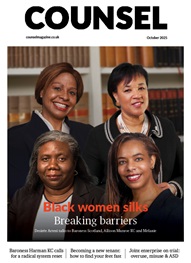*/
Shadow Attorney General Dominic Grieve lambasted the waste of money on an “entirely unnecessary” Supreme Court, when he delivered the recent Boydell lecture.
The government was “wasting” more than £130 million on an “entirely unnecessary set of new premises for the equally unnecessary Supreme Court, with a quadrupling of subsequent running costs”, he said, while the impact of legal aid reforms has left law firms “struggling”.Mr Grieve went on to lament the “slow death of ministerial responsibility”. “Over the last few years there has been a drive to actually achieve the separation of powers so beloved of Montesquieu. In furtherance of this, we are going to have our Supreme Court, have created a Judicial Appointments Commission and removed the judicial role of the Lord Chancellor. The Government is now discussing the propriety of the Attorney General taking any prosecutorial decisions, and it has even been suggested that the Attorney’s role as legal adviser to government should be given to a non-political lawyer. “Although no final decision has been taken on the future role of the Attorney, it is the case that the present Attorney is already operating under a self-denying ordinance in respect of keeping her distance from any sensitive investigations in which her involvement is not required by statute.”
In a wide-ranging speech, Grieve vowed not to interfere with the jury system or rules of evidence. A “major priority” for a Conservative administration would be providing extra prison capacity of 5,000 places above the government’s figure including after care to improve rehabilitation, he said.
Mr Grieve also expressed delight that the Bar Council had revisted the possibility of a Contingency Legal Aid Fund (“CLAF”). “It’s a proposal in which I took an interest in the mid 1990s before I was elected to Parliament.” However he stressed that the “key to resuscitating justice lay not just in policy but in the attitude of politicians and particularly the Executive.”
The government was “wasting” more than £130 million on an “entirely unnecessary set of new premises for the equally unnecessary Supreme Court, with a quadrupling of subsequent running costs”, he said, while the impact of legal aid reforms has left law firms “struggling”.Mr Grieve went on to lament the “slow death of ministerial responsibility”. “Over the last few years there has been a drive to actually achieve the separation of powers so beloved of Montesquieu. In furtherance of this, we are going to have our Supreme Court, have created a Judicial Appointments Commission and removed the judicial role of the Lord Chancellor. The Government is now discussing the propriety of the Attorney General taking any prosecutorial decisions, and it has even been suggested that the Attorney’s role as legal adviser to government should be given to a non-political lawyer. “Although no final decision has been taken on the future role of the Attorney, it is the case that the present Attorney is already operating under a self-denying ordinance in respect of keeping her distance from any sensitive investigations in which her involvement is not required by statute.”
In a wide-ranging speech, Grieve vowed not to interfere with the jury system or rules of evidence. A “major priority” for a Conservative administration would be providing extra prison capacity of 5,000 places above the government’s figure including after care to improve rehabilitation, he said.
Mr Grieve also expressed delight that the Bar Council had revisted the possibility of a Contingency Legal Aid Fund (“CLAF”). “It’s a proposal in which I took an interest in the mid 1990s before I was elected to Parliament.” However he stressed that the “key to resuscitating justice lay not just in policy but in the attitude of politicians and particularly the Executive.”
Shadow Attorney General Dominic Grieve lambasted the waste of money on an “entirely unnecessary” Supreme Court, when he delivered the recent Boydell lecture.


Justice system requires urgent attention and next steps on the Harman Review
Q&A with Tim Lynch of Jordan Lynch Private Finance
By Marie Law, Director of Toxicology at AlphaBiolabs
By Louise Crush of Westgate Wealth Management
Why Virtual Assistants Can Meet the Legal Profession’s Exacting Standards
Despite increased awareness, why are AI hallucinations continuing to infiltrate court cases at an alarming rate? Matthew Lee investigates
Many disabled barristers face entrenched obstacles to KC appointment – both procedural and systemic, writes Diego F Soto-Miranda
The proscribing of Palestine Action under the Terrorism Act is an assault on the English language and on civil liberties, argues Paul Harris SC, founder of the Bar Human Rights Committee
For over three decades, the Bar Mock Trial Competition has boosted the skills, knowledge and confidence of tens of thousands of state school students – as sixth-form teacher Conor Duffy and Young Citizens’ Akasa Pradhan report
Suzie Miller’s latest play puts the legal system centre stage once more. Will it galvanise change? asks Rehna Azim